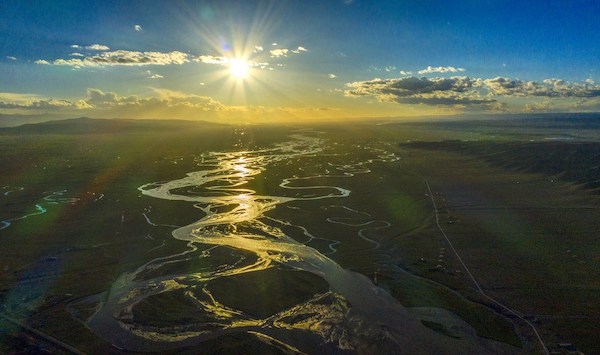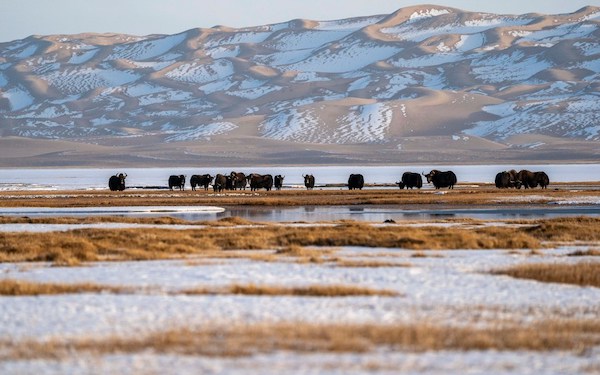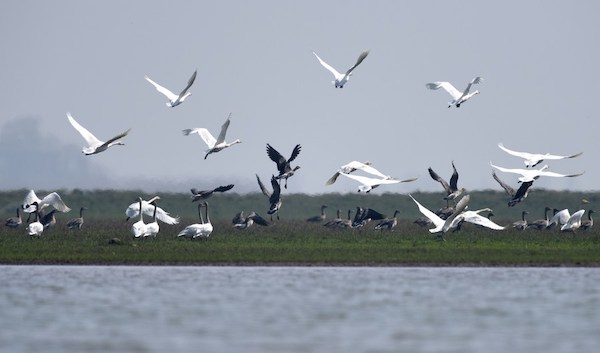China beefs up wetlands conservation to enhance people's well-being
* China now boasts 56.35 million hectares of wetlands.
* During the ongoing 14th Meeting of the Conference of the Contracting Parties to the Ramsar Convention on Wetlands (COP14), China called for enhancing people's well-being globally by leveraging the role of wetlands in promoting sustainable development, tackling climate change, protecting biodiversity, and delivering more benefits to people around the world.
* China's wetlands conservation efforts have illustrated its genuine commitment to ensuring harmonious coexistence between humans and nature.
CHANGSHA/XINING -- Yang Chunlin, a shutterbug in northwest China's Qinghai Province, visits a wetland bordering the Yellow River every October to meet his long-acquainted friends: whooper swans. Yang is very happy to have seen the number of the swans surge to over 100 from 30-plus when he first came to the area.
The wetland is located in Hualong Hui Autonomous County, where the Yellow River swirls and becomes gentle, and aquatic plants are abundant, creating a unique ecosystem.
"The wetland provides an ideal living environment for whooper swans. The beautiful 'swan lake' has become a place for photography lovers to linger," Yang said.

This aerial photo taken on July 18, 2020 shows a view of Buh River wetland at Qinghai Lake in northwest China's Qinghai Province. (Photo by Yang Tao/Xinhua)
Known as the "kidneys of the Earth," wetlands can help safeguard biodiversity and cope with climate change. China's wetlands conservation efforts have illustrated its genuine commitment to ensuring harmonious coexistence between humans and nature.
During the ongoing 14th Meeting of the Conference of the Contracting Parties to the Ramsar Convention on Wetlands (COP14), held in Wuhan and Switzerland's Geneva, China called for enhancing people's well-being globally by leveraging the role of wetlands in promoting sustainable development, tackling climate change, protecting biodiversity, and delivering more benefits to people around the world.
China has made relentless efforts in wetlands protection and restoration and witnessed remarkable progress over the past decade. China now boasts 56.35 million hectares of wetlands, including marshes, beaches and lakes, according to the latest land resource surveys.

The flag handover ceremony is held during the opening ceremony of the 14th Meeting of the Conference of the Contracting Parties to the Ramsar Convention on Wetlands in Wuhan, central China's Hubei Province, Nov. 5, 2022. (Xinhua/Wu Zhizun)
It has set up over 600 wetland nature reserves, and more than 1,600 wetland parks, and it is home to 64 wetlands of international importance and 29 wetlands of national importance. China's first specialized law governing wetland protection took effect in June 2022.
China will designate a number of national parks, covering about 10 percent of the country's land area, and incorporate about 11 million hectares of wetlands into the national park system.
Qinghai is the source of the Yangtze River, Yellow River and Lancang River, and is known as the "Water Tower of China."
The two large lakes -- Gyaring and Ngoring -- in the Yellow River's headwaters region, saw their surface areas increase by 74.6 and 117.4 square km respectively from 2015. The number of lakes in Madoi, dubbed "the county of a thousand lakes," increased from 4,077 to 5,849.
The province has designated a public welfare post called wetland ecological conservator since 2015. So far, there are 963 such conservators across Qinghai, with a monthly income of 1,800 yuan (249 U.S. dollars).

This photo taken on April 2, 2019 shows wild yaks foraging in a wetland in the Altun Mountains National Nature Reserve in northwest China's Xinjiang Uygur Autonomous Region. (Xinhua/Hu Huhu)
Since 2016, Qinghai has invested over 1 billion yuan in the implementation of a series of wetlands protection projects, restoring a number of degraded wetlands, improving the ecological condition of some important wetlands, and effectively enhancing the water conservation capacity of alpine plateau wetlands and river headwaters, according to Ma Jianhai, head of the wetland management office under the provincial forestry and grassland department.
Rich in reeds, Dongting Lake in the middle reaches of the Yangtze in central China's Hunan Province once gave rise to many paper-making and pulp-making mills. While contributing to taxes and employment, such mills also caused water pollution. In 2018, the provincial authorities ordered the shutdown of all pulp-making and outdated paper-making capacity around the lake, and now all paper mills in this area have been closed.
In addition to factories, over 17,000 fishermen and nearly 12,000 boats at Dongting have also been phased out. Meanwhile, a fishermen relocation project with an investment of 998 million yuan is underway, which will accommodate over 1,200 households from three fishing villages.

Little swans and bean geese are seen at the Dongting Lake in central China's Hunan Province, Feb. 26, 2018. (Xinhua/Li Ga)
Many wetlands have thus regained their former beauty, while industries such as ecological breeding and ecological tourism have increased incomes for local residents.
"I shall move into my new house by the end of this year. With the help of the government, I have found a job as a security guard as part of the relocation project. Now I have an income of 3,000 to 4,000 yuan every month," said 60-year-old Tu Xiaonian, a former fisherman.
Data provided by Hunan's environmental authority showed that with the continuous improvement of water conditions, the number of wintering waterbirds in Dongting reached 404,000 in the period from 2021 to 2022 -- a record high.
"Through a series of ecological protection actions, China has demonstrated the positive role of wetlands conservation in coping with climate change, preserving biodiversity and improving the living environment of humans, and contributed more wisdom and solutions to building a community of all life on Earth," said Lei Guangchun, a professor at Beijing Forestry University.

Ministry of Justice of the
People's Republic of China
All rights reserved. Presented by China Daily.
京ICP备13016994号-2


